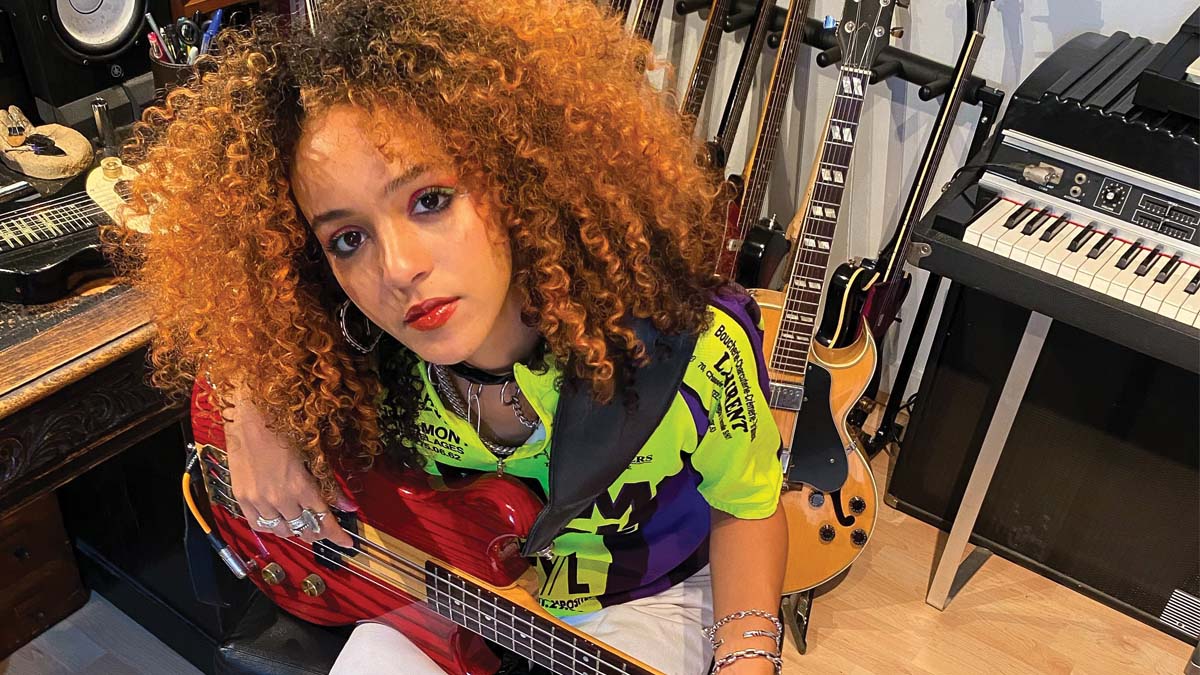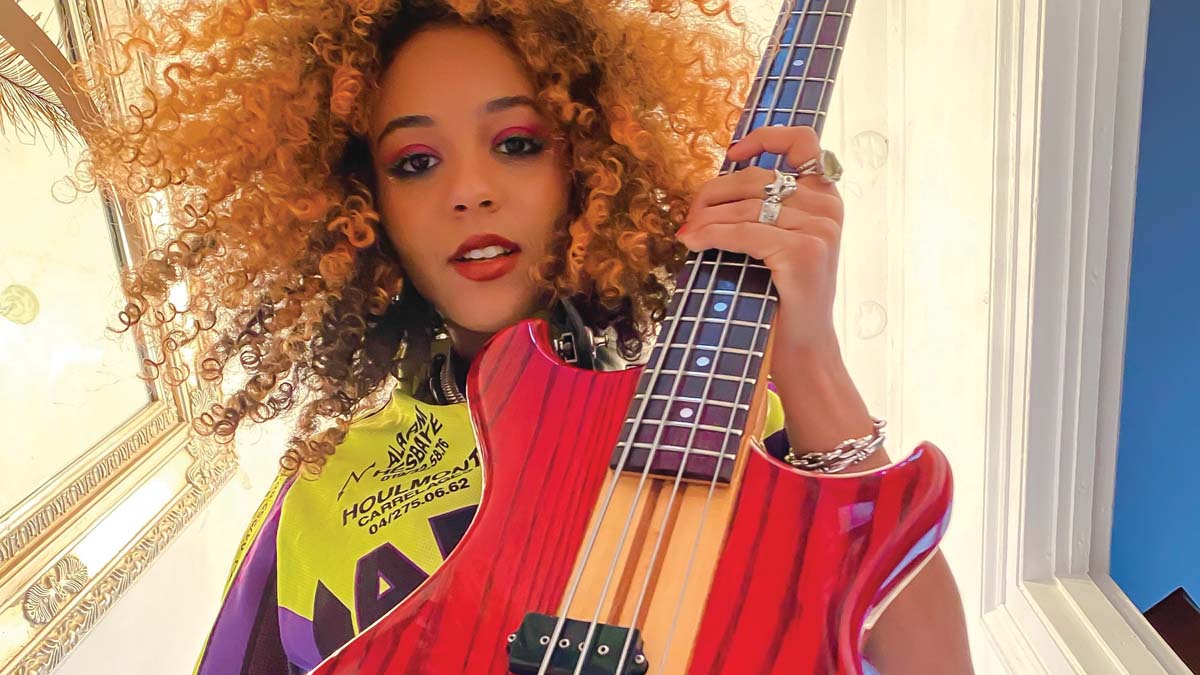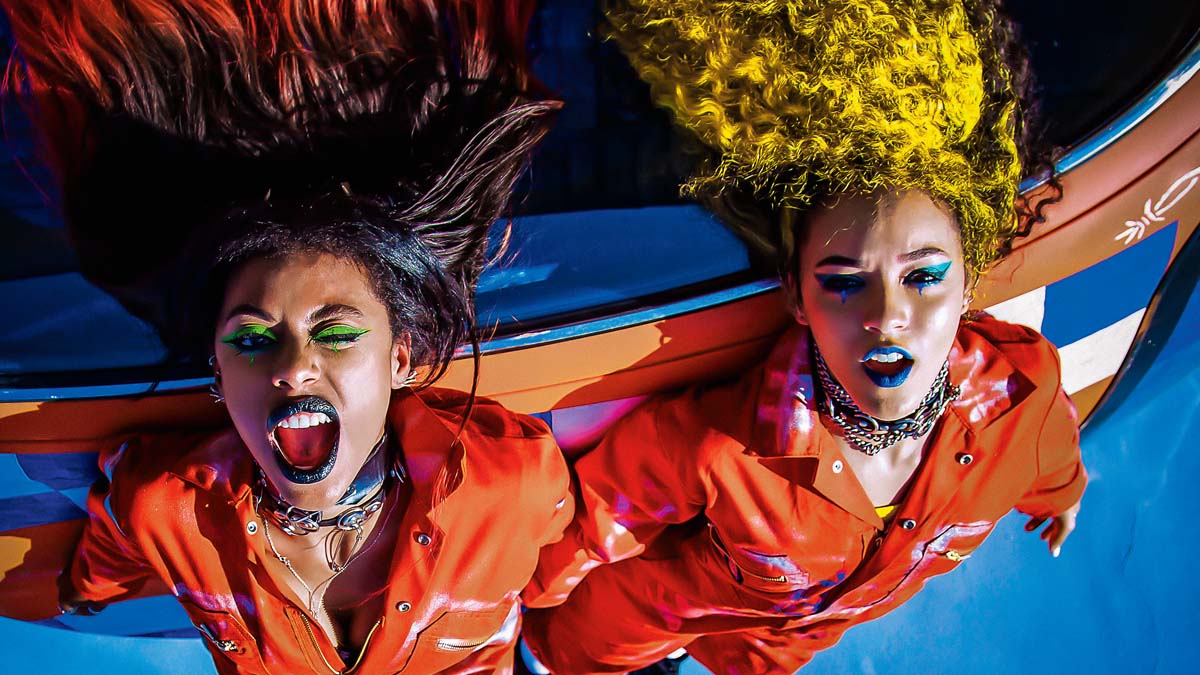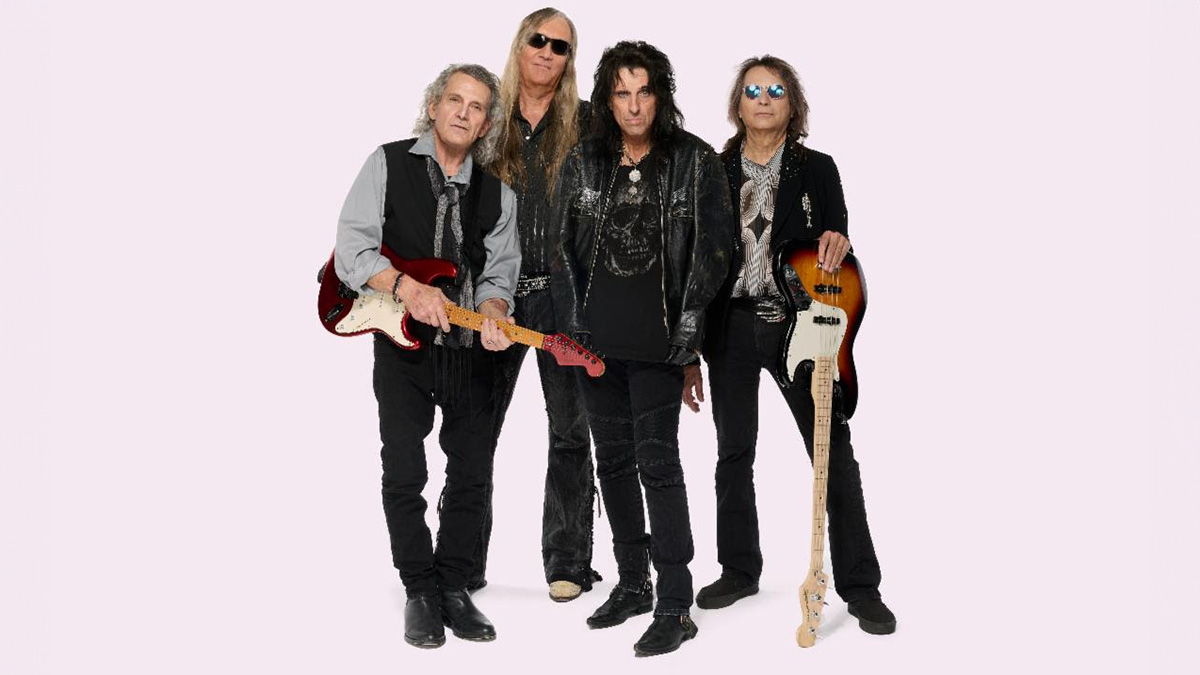Nova Twins' Georgia South: “I love the sound of heavy electronic music and dubstep. I find inspiration in how the bass sits in those songs“
The effects-keen bassist brings a huge tone – and attitude – to modern rock music. We find out (partly) how it’s done

UK-based duo Nova Twins, formed of guitarist Amy Love and bassist Georgia South, have been making a highly enjoyable racket for the last five years without making a huge name for themselves: none other than Tom Morello of Rage Against The Machine described them as ‘the best band you’ve never heard of’ after they supported Prophets Of Rage.
That that would no doubt have changed in 2020, given that the Twins’ debut album Who Are The Girls? was released in February, just weeks before the global shutdown wiped out a whole year’s worth of touring.
Undeterred, South and Love have been writing and recording in this unexpected downtime, with the former also finding time to talk to BP about huge bass guitar tones, bespoke effects chains, and pushing the demographic envelope.
I have three Westone Thunder I basses. I love them, and I’m so annoyed that they don’t make them any more
What’s been keeping you occupied during the pandemic, Georgia?
“We’re in a routine of talking through FaceTime and sending ideas to each other, so we’ve been writing loads and working on the second album. We lucked out, really, because we have the time to do it. If we’d been playing festivals and touring, the second album would be rushed, rather than us having time to enjoy the process.“
What basses do you play?
“I have three Westone Thunder I basses. I love them, and I’m so annoyed that they don’t make them any more – although that also gives them a cool edge, because they’re really hard to get hold of.“
Get The Pick Newsletter
All the latest guitar news, interviews, lessons, reviews, deals and more, direct to your inbox!
Why did you choose to play a Westone?
“I feel like it chose me. I was at a friend’s house and I saw the red one that I’ve got, hanging on the wall. I was looking for a bass at the time, and I was like, ‘My God, what is that?’ I’d never seen a bass that had that red zebra print on it. He told me it was his dad’s bass but that he barely played it, so I asked his dad if I could buy it and he said yes.
“It just sounds so fat, and even though it’s a passive bass with standard pickups, it has such a clean sound. I tried an active Westone but it glitches out the pedals too much and I can’t control it, so mine are passive.
Where do you get your basses?
“I get them off Reverb. I’ve never found another red one, but I’ve got my eye open for one. That one is super-rare as a passive bass, although there are loads of active ones. It’s not like any other bass. It’s so heavy to carry, which adds to it somehow.
Fender recently sent me a fretless Jazz bass, which is so different to my Westone, and sounds wicked with my pedals
“The way it plays with the pedals is so weighty. We’ve toured with huge bands like Prophets Of Rage, and Tim Commerford was like, ‘Damn, your sound is huge!’ even though I was only using a tiny Gallien-Krueger bass combo, and he had two massive stacks.“

Your sound is enormous. It sounds like you’re running more than one distortion.
“I’ve got a few distortions, but I don’t really run down my pedals. If you look at my 'board it’s all super-taped up. I used to have it not taped up, but I’d do a show and people would just run up on stage, take pictures of my 'board and post it online, and I felt so violated.
“You’ve spent so many years building up this 'board and your sound, that for someone just to take a picture and copy it, I can’t be dealing with it, so I just got some duct tape and stickers and taped the fuck out of the whole 'board.
“I can say that most of my pedals are very cheap and that anyone could get them. I guess it’s the combination of effects that counts. Fender recently sent me a fretless Jazz Bass, which is so different to my Westone, and sounds wicked with my pedals.“
Have you always had a monstrous tone?
“I’ve always been driven towards distortion, for sure, but the pedalboard definitely grew through Nova Twins. I used to go to Denmark Street in London with my dad and not even know what I was looking for. I just knew I wanted a new pedal, so I’d try some out and think, ‘This is super-cool.’ It all blended really well, and after a while I knew what I needed to make the sound in my head.
“I love the sound of heavy electronic music and dubstep, with gnarly, heavy synth bass, but I knew that I didn’t want to play a synth or have a laptop or keyboard –I wanted to play a bass guitar – so whenever I went to a shop I looked for sounds that I can manipulate and bend, which I love doing. It’s like I’m singing through the bass because it moves around so much. You could sing the melodies that I play.“
My first bass was a Fender Bronco, which I hated because I felt really uncool with it. I covered it in stickers and drew on it and it still didn’t get any cooler
Did you have specific tonal inspirations?
“I looked at songs like N.E.R.D.’s Anti Matter. I don’t know if it’s a bass or a synth, but the intro to that song was a revelation to me. I knew it was the kind of music that I wanted to make, if it made people feel like that. Hip-hop, too – I love Missy Elliott, Kanye West’s Late Registration album, Eminem, Dr Dre, Skepta, Dizzee Rascal... I find inspiration in how the bass sits in those songs.“
How did you become a bass player?
“I’m from a musical background. My dad William South is a jazz pianist and plays in the band Heavy Shift, and my brother plays bass and my mum sings, so we always jammed. I played piano when I was young, but one day when I was around 13 I just thought, ‘I want to have something a bit more gnarly and to the front,’ so I picked up the bass – and I knew I wanted to be a bass player straight away.
“My dad taught me the basics and my first bass was a Fender Bronco, which I hated because I felt really uncool with it. I covered it in stickers and drew on it and it still didn’t get any cooler. I played it so low too, down by my knees. You have to go through that stage, though.“

Did any other bass players inspire you back then?
“There was a key moment when I was younger, when I started thinking that I could actually be a bassist as a career. It was when I saw Beyoncé and she had an all-female band, with Divinity Roxx on bass. She was doing a solo in front of the whole stadium – and, especially her being a woman of color, I was like, ‘Damn! It’s actually possible!’
“I met Divinity a while back and I got to tell her that, which was amazing because she was such an important part of my growth. I did a Destiny’s Child cover when I was 16 and put it on YouTube, and she shared it and I said, ‘Oh my God, she thinks I’m good!’“
Divinity Roxx was doing a solo in front of the whole stadium – and, especially her being a woman of color, I was like ‘Damn! It’s actually possible!’
What are your objectives with Nova Twins?
“When we were growing up, we didn’t have a lot of people to look up to in the music that we loved that looked like us, so it’s been great growing our audience and seeing ourselves in there.
“We want to empower people of color, to empower women, to empower the LBGT community, and anyone who feels like they didn’t have a face to look to in rock, and just break that stereotype. When we were coming up, people were like, ‘Are you an R&B band? Are you dancers?’ when we literally had guitars strapped to our backs.
“We realized that we need to wipe out this whole stereotype that you can only be an R&B artist or a rapper if you’re black. We played a lot of festivals in 2019 and we would be the only women on the bill, or the only people of color. Everyone should be able to listen to our music and feel badass and empowered.“
- Nova Twins album Who Are the Girls is out now via 333 Wreckords Crew.
Bass Player is the world’s most comprehensive, trusted and insightful bass publication for passionate bassists and active musicians of all ages. Whatever your ability, BP has the interviews, reviews and lessons that will make you a better bass player. We go behind the scenes with bass manufacturers, ask a stellar crew of bass players for their advice, and bring you insights into pretty much every style of bass playing that exists, from reggae to jazz to metal and beyond. The gear we review ranges from the affordable to the upmarket and we maximise the opportunity to evolve our playing with the best teachers on the planet.
“When I first heard his voice in my headphones, there was that moment of, ‘My God! I’m recording with David Bowie!’” Bassist Tim Lefebvre on the making of David Bowie's Lazarus
“One of the guys said, ‘Joni, there’s this weird bass player in Florida, you’d probably like him’”: How Joni Mitchell formed an unlikely partnership with Jaco Pastorius







![[from left] George Harrison with his Gretsch Country Gentleman, Norman Harris of Norman's Rare Guitars holds a gold-top Les Paul, John Fogerty with his legendary 1969 Rickenbacker](https://cdn.mos.cms.futurecdn.net/TuH3nuhn9etqjdn5sy4ntW.jpg)





